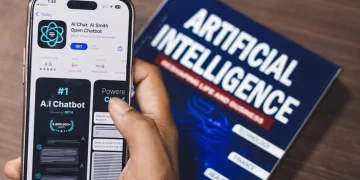Artificial Intelligence in healthcare vastly enhances diagnostics, analyses patient data for accurate predictions, and streamlines administrative tasks. Its application ranges from machine learning algorithms to Natural Language Processing (NLP), improving healthcare efficiency and patient outcomes. AI automates tasks, aids in medical imaging, and executes proactive treatment strategies. It significantly contributes to remote patient monitoring, offering personalised care and optimising operational procedures. AI also brings transparency to treatment outcomes and biases. Further exploration will reveal how AI has become a binding force between patients’ needs and healthcare delivery by revolutionising detection and diagnostic processes.
Main Points
- Artificial Intelligence in healthcare is used to analyse patient data and research, aiding in accurate diagnoses and personalised treatment plans.
- Through machine learning and Natural Language Processing, AI identifies patterns in clinical documentation, enhancing diagnostic accuracy.
- Artificial Intelligence in healthcareautomates various healthcare tasks like billing, scheduling, and patient monitoring, improving operational efficiency and patient satisfaction.
- Artificial Intelligence in healthcare also include analysing medical images and predicting treatment outcomes, supporting proactive healthcare strategies.
- AI is transforming the healthcare sector by streamlining administrative tasks, optimising workflows, and facilitating virtual consultations for personalised care.
Understanding Artificial Intelligence in Healthcare
Artificial Intelligence in healthcare refers to the use of complex algorithms and software to emulate human cognition in the analysis, interpretation, and comprehension of complicated medical and healthcare data. AI is transforming the healthcare industry by providing a variety of benefits through automation of tasks that are typically done by humans.
Here are some key applications of AI in healthcare:
- Disease Diagnosis: AI can be used to analyse medical images such as X-rays, CT scans, or MRI images, to automatically detect diseases such as cancer, pneumonia, or brain tumors.
- Drug Discovery: AI can help in the discovery of new drugs by analysing large amounts of data related to the genetic makeup of diseases or the chemical compounds of drugs.
- Personalised Medicine: AI can analyse a patient’s genetic information and lifestyle to provide personalised treatment plans.
- Predictive Analysis: AI can predict disease outbreaks or a patient’s risk of developing a certain disease based on various data such as medical records, environmental factors, and lifestyle habits.
- Robotic Surgery: AI-powered robots can assist surgeons in performing complex surgeries with precision and accuracy.
- Virtual Health Assistants: AI can provide patients with health assistance in the form of reminders to take their medication, answering health-related questions, or helping schedule doctor’s appointments.
- Telemedicine: With AI, patients can receive medical consultation remotely, reducing the need for physical hospital visits.
- Administrative Tasks: AI can help reduce the workload of healthcare providers by automating administrative tasks such as scheduling appointments or managing patient records.
Challenges with AI in healthcare include issues related to data privacy, the need for extensive training data to develop accurate AI models, and the potential for job displacement in the healthcare industry. However, the potential benefits of AI in improving patient care and healthcare efficiency are significant.”
Artificial intelligence in healthcare, plays an essential role in processing clinical documentation, identifying patterns, and making highly accurate predictions. AI employs high-end data science techniques and machine learning algorithms to interpret and analyze extensive healthcare datasets, transforming the landscape of medical diagnosis and personalized treatment.
Natural Language Processing (NLP) is a vital AI component that enables computers to decipher human language, ensuring precise diagnosis and customized services. By interpreting patient records, clinical notes, and other health-related texts, NLP contributes significantly to patient care quality.
Artificial Intelligence in healthcare role also extends to rule-based Expert Systems, which traditionally used ‘if-then’ rules for clinical decision support. However, with advancements in AI, machine learning is replacing these systems, paving the way for more sophisticated and robust medical algorithms.
Moreover, AI automates several healthcare tasks, such as data entry, claims processing, and appointment scheduling. This reduces errors and enhances the operational efficiency of healthcare institutions. Artificial Intelligence in healthcare is reshaping healthcare outcomes and research, propelling the sector towards a more data-driven and patient-centric approach.
AIs Role in Disease Diagnosis
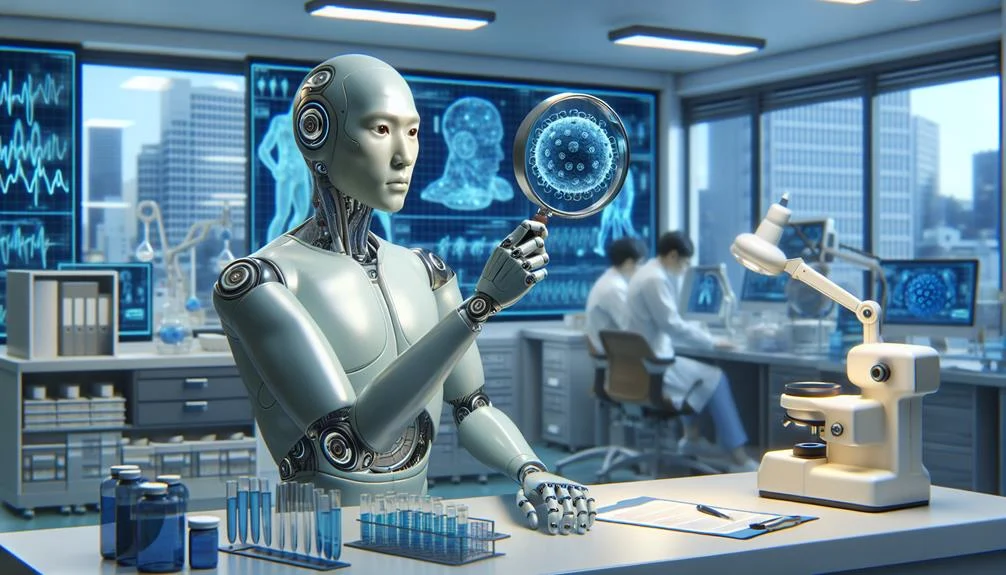
Moving beyond the general applications of Artificial Intelligence in healthcare, it is significant to note the substantial impact this technology has in disease diagnosis, mainly through its prowess in analysing medical images and detecting patterns in patient data. AI’s ability to interpret medical images such as X-rays, MRIs, and CT scans with high precision affords it a critical role in diagnosing diseases early and accurately.
Using machine learning algorithms, Artificial Intelligence in healthcare can identify subtle abnormalities in images that humans may overlook. This contributes to enhanced diagnostic accuracy, thereby facilitating timely interventions. Moreover, AI-driven diagnostic tools provide healthcare professionals with data-driven insights and predictions, aiding them in making informed decisions.
AI’s application in disease diagnosis goes beyond mere detection. It fosters a more data-centric approach to healthcare, leveraging patient data to predict health trends and potential risks. This improves diagnostic accuracy and enhances patient outcomes by facilitating proactive treatment strategies. AI’s role in disease diagnosis is revolutionising healthcare, paving the way for a future where healthcare professionals can leverage AI’s capabilities for improved patient care.
AI in Treatment Planning and Execution
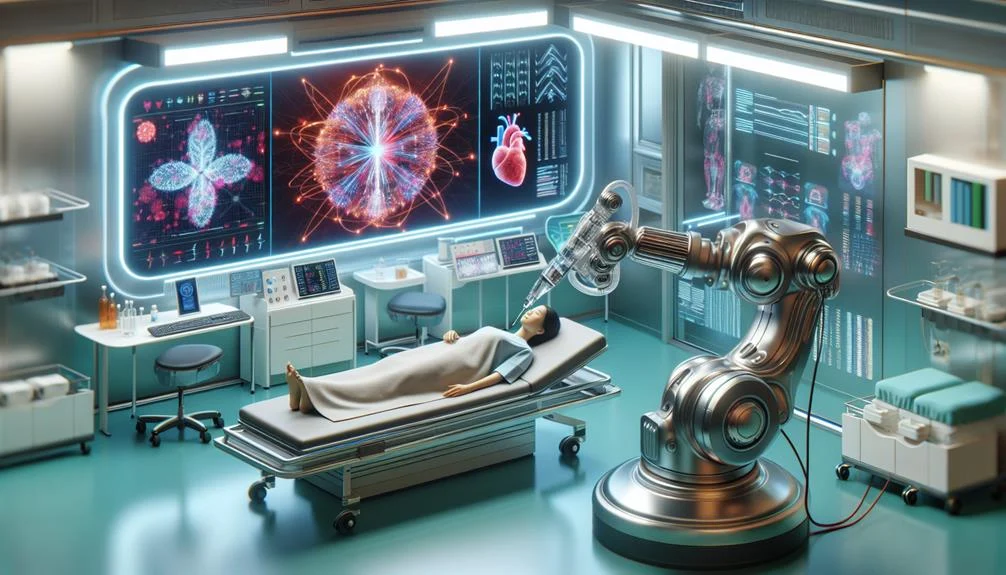
Artificial Intelligence in healthcare plays a key role by meticulously analysing a myriad of patient data, medical records, and research to propose personalized treatment options. Machine learning algorithms are integral to AI in treatment planning, predicting treatment outcomes based on historical data and individual patient characteristics.
Artificial Intelligence in healthcare further refines the process by optimizing treatment execution, monitoring patient responses and adjusting treatment plans in real-time. This continues to improve treatment efficiency, enhancing the quality of patient care while minimizing errors.
Healthcare professionals are also empowered by AI applications to make more informed decisions about treatment strategies. This includes dosage adjustments and potential side effects, further optimizing patient outcomes.
| AI Applications | Impact |
|---|---|
| Predicting treatment outcomes | Improves accuracy and efficiency |
| Monitoring patient responses | Enables real-time adjustments |
| Improving treatment efficiency | Enhances quality of care |
| Guiding informed decisions | Optimizes treatment strategies |
Improving Patient Engagement Through Artificial Intelligence
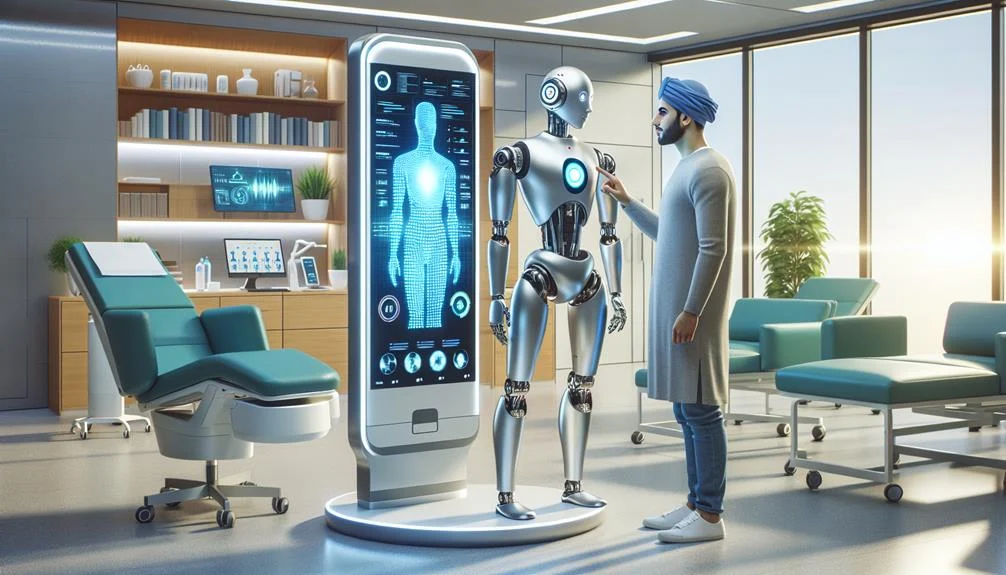
Artificial Intelligence holds substantial potential to enhance patient engagement in healthcare. AI can optimise remote patient monitoring through telemedicine services, providing timely care and reducing unnecessary hospital visits.
Artificial Intelligence in Telemedicine Services
In telemedicine services, Artificial Intelligence plays a pivotal role in bolstering patient engagement through the implementation of virtual consultations and remote monitoring. AI empowers virtual health assistants to provide personalised care, making precise treatment recommendations based on thorough patient data analysis. These AI algorithms adeptly detect patterns and predict future health outcomes, enabling proactive interventions that can prevent complications.
AI is integrated into telemedicine platforms, access to healthcare services expands, particularly benefiting rural and underserved areas. The result is a transformation in healthcare delivery efficiency, with AI leading to higher patient satisfaction and improved health outcomes. This illustrates the profound impact of AI on enhancing patient engagement within telemedicine services.
Personalising Patient Care
Shifting the focus to personalised patient care, it is evident that artificial intelligence greatly enhances patient engagement by analysing individual health data and preferences to create tailored treatment plans. This intentional shift towards personalised care is driven by:
- The use of AI in providing real-time health monitoring, thereby facilitating continuous monitoring of patients’ health status.
- The creation of interactive communication channels, such as virtual health assistants and remote monitoring apps, which empower patients to actively participate in their healthcare journey.
- The ability of Artificial Intelligence in healthcare to provide personalised health recommendations, fostering proactive healthcare management.
- The empowerment of patients to make informed decisions about their health, as AI tools provide personalised care plans based on continuous monitoring and analysis of individual health data.
These advancements underscore the transformative potential of AI in personalising patient care and enhancing patient engagement.
AIs Role in Follow-ups
AI-driven follow-up systems, powered by intricate AI algorithms, leverage patient data analysis to automate these reminders and generate personalised messages, ensuring treatment plan adherence. This enables healthcare providers to monitor patient progress remotely and facilitates timely interventions.
With the capacity to analyse vast amounts of patient data, AI algorithms can provide personalised recommendations, further boosting patient engagement. The ultimate result is better health outcomes, as patients are more inclined to adhere to prescribed treatment plans and schedules.
AI’s role in follow-ups is pivotal in realising the full potential of patient engagement strategies in healthcare.
Administrative Applications of Artificial Intelligence in Healthcare
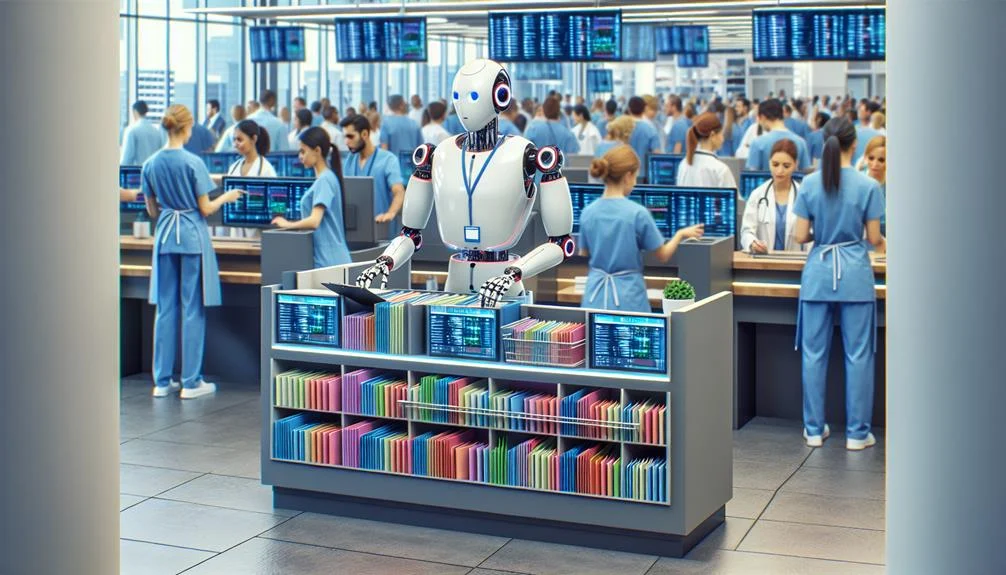
The arrival of Artificial Intelligence in healthcare has transformed administrative tasks, seamlessly automating functions such as billing, scheduling, and claims processing to enhance operational efficiency and patient care. AI in healthcare has enabled a streamlined execution of routine tasks, profoundly reducing the time spent on administrative duties and allowing healthcare professionals to focus on patient care.
- AI Virtual Nursing Assistants: AI-powered assistants provide patients with round-the-clock support, assisting with appointment scheduling, answering queries, and providing general information. This improves the patient experience and guarantees continuity of care.
- Healthcare Fraud Prevention: AI’s advanced pattern recognition capabilities can detect unusual patterns in billing and claims processing, combating healthcare fraud and ensuring financial integrity.
- Automated Medication Administration: Artificial Intelligence in healthcare reduces the risk of dosage errors in medication administration. By automating this process, patient safety and the quality of care improve to a great extent.
- Operational Efficiency: Artificial Intelligence in healthcare not only streamlines administrative tasks but also optimises healthcare workflows. This efficiency allows healthcare providers to deliver timely, accurate, and personalised care to patients.
With these transformative applications, AI is redefining healthcare administration, making it efficient, secure, and patient-centric.
Ethical Considerations With Artificial Intelligence in Healthcare

While artificial intelligence has dramatically improved efficiency and accuracy in healthcare, it also presents critical ethical considerations related to accountability, transparency, permission, and privacy. Deep learning algorithms, though revolutionary, sometimes lack transparency, making it challenging for healthcare practitioners to explain certain diagnoses. This opacity can result in a breach of trust and legal complications.
AI systems may exhibit algorithmic bias, potentially affecting medical decisions. This bias could favour certain patient groups over others, creating disparities in healthcare delivery. Healthcare institutions must establish robust governance mechanisms to address these ethical concerns arising from AI applications.
| Ethical Concern | AI Application | Healthcare Impact |
|---|---|---|
| Accountability | AI misdiagnosis | Legal implications |
| Transparency | Deep learning algorithms | Trust issues |
| Permission | Data access and use | Patient autonomy |
| Privacy | Personal data processing | Confidentiality breach |
Beyond these, there is also the question of who is responsible when an AI system makes a mistake – the healthcare provider, the AI developer, or the algorithm itself? These complex queries underline the importance of developing thorough ethical frameworks for AI application in healthcare.
Artificial Intelligence Impact on Healthcare Workforce
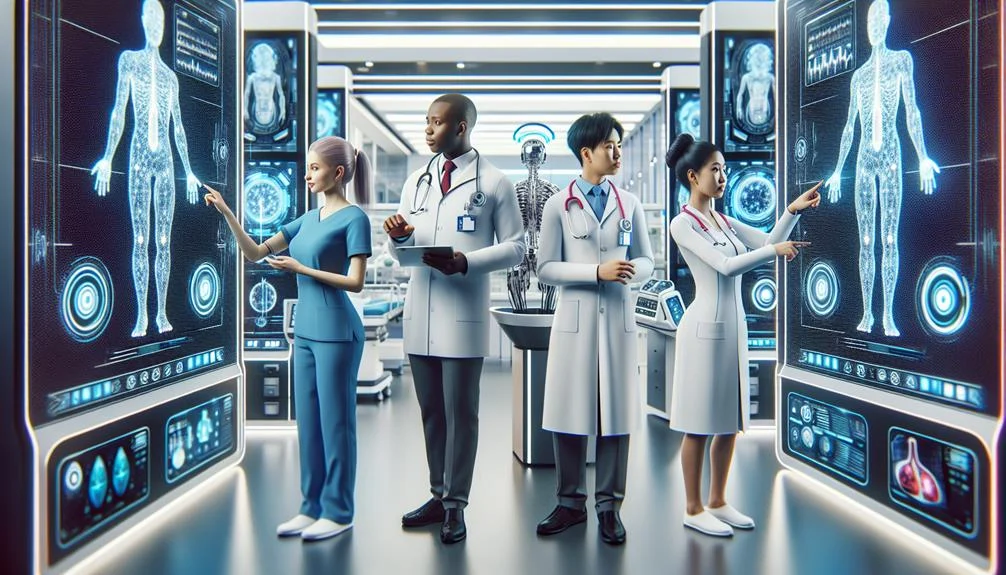
In the rapidly evolving healthcare landscape, Artificial Intelligence in healthcare presents both opportunities and challenges for the workforce, with research indicating that job losses due to AI integration could be as limited as 5%. Yet, this figure belies the profound structural changes that AI is set to introduce.
- AI integration into clinical workflows and EHR systems: The gradual infiltration of AI into these areas has delayed immediate job loss but has begun to reshape how healthcare professionals operate, adding complexity to daily tasks.
- Automation in radiology and pathology: Jobs in these sectors are more susceptible to automation as they deal heavily with digital information. This does not mean total job loss but rather a shift in responsibilities.
- Emphasis on human skills: The arrival of AI has highlighted the irreplaceable value of human skills in healthcare, emphasising communication, empathy, and decision-making.
- Job security and adaptation: As Artificial Intelligence in healthcare becomes more prevalent, job security may hinge on adaptability and continuous learning. Healthcare professionals will need to evolve alongside the technology, embracing AI as a tool rather than a threat.
The impact of AI on the healthcare workforce is nuanced and multifaceted, necessitating a thoughtful and proactive response.
Future Developments of Artificial Intelligence in Healthcare
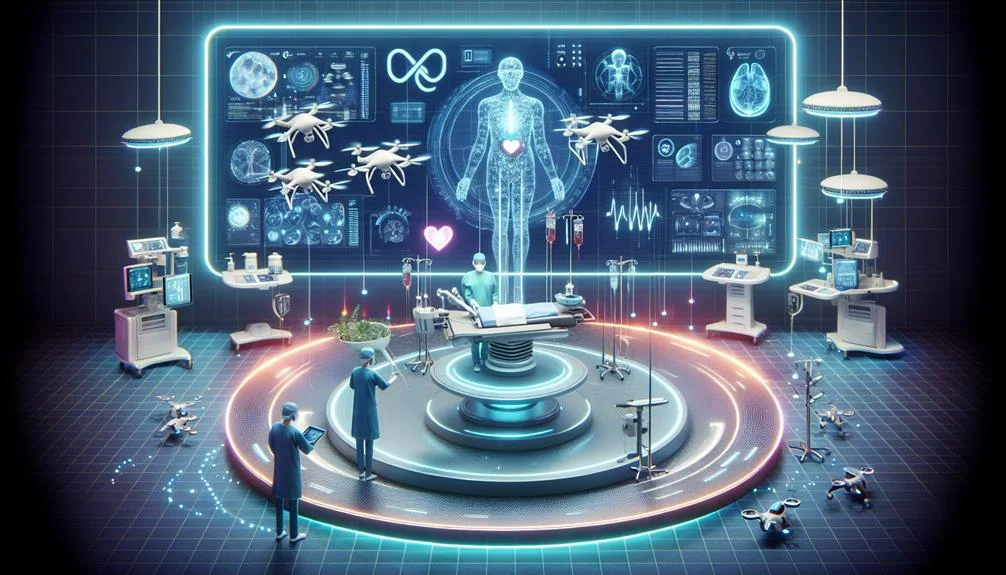
The potential for future developments in healthcare AI is vast, particularly in medical diagnosis, personalised medicine, and surgical procedures.
Advanced algorithms could revolutionise diagnostic processes, enabling more accurate, early detection of diseases.
Simultaneously, AI’s capabilities could be harnessed to tailor medical treatments to individual patient needs, while AI-integrated robotics could enhance surgical precision and safety.
Artificial Intelligence in Medical Diagnosis
How might future developments in artificial intelligence revolutionise the field of medical diagnosis, enhancing accuracy, efficiency, and overall healthcare quality?
- AI algorithms: By analysing vast quantities of medical data, AI algorithms could dramatically improve the accuracy and speed of diagnosis, leading to better patient outcomes.
- Deep learning: This advanced machine learning technique could revolutionise disease detection, even in its earliest stages, vastly improving healthcare quality.
- Predictive analytics: This could allow for early disease detection and the opportunity for preemptive treatments, notably increasing efficiency within the healthcare system.
- Personalised treatment plans: By analysing individual patient data, AI could facilitate more personalised treatment plans, which could improve the effectiveness of treatments and positively impact patient outcomes.
These developments hint at a future where AI is integral to medical diagnosis.
AI for Personalised Medicine
Harnessing the power of artificial intelligence for personalised medicine, healthcare experts aim to utilise vast patient data, individual characteristics, and genetic makeup to tailor exact and effective treatment plans. AI’s unprecedented ability to analyse large datasets allows for identifying patterns and correlations, leading to more effective therapies.
This approach, deeply rooted in each patient’s unique needs, enables healthcare providers to offer precision treatments, enhancing outcomes while minimising adverse effects. In the future, AI’s advancements in personalised medicine are set to revolutionise treatment, changing how diseases are diagnosed and treated. This will optimise patient care, making it more individualised, efficient, and effective.
Artificial Intelligence in Surgical Procedures
As we turn the page to the future, artificial intelligence stands poised to revolutionize surgical procedures, with autonomous robotic surgeons and AI tools playing increasingly integral roles in complex surgeries.
- Autonomous Robotic Surgeons: AI is ushering in a new era where autonomous robotic surgeons can perform precise operations, minimizing human error and improving patient care.
- Virtual Reality Therapy: Leveraging virtual reality technologies can help manage patient’s pain and anxiety, enhancing their overall experience.
- Medical Images Analysis: AI tools are deployed for analyzing medical images, thereby increasing diagnostic accuracy and making surgeries more efficient.
- Augmented Reality in Medical Education: Augmented reality and virtual reality technologies are transforming medical education and training, preparing medical practitioners for the future of healthcare.
Conclusion
To sum up, integrating Artificial Intelligence in healthcare has transformed patient diagnosis, treatment planning, and engagement while streamlining administrative tasks.
However, ethical dilemmas and workforce implications must be addressed.
As Artificial Intelligence in healthcare continues to evolve, it is essential to harness its potential wisely, ensuring an efficient, effective, and patient-centric healthcare environment.



